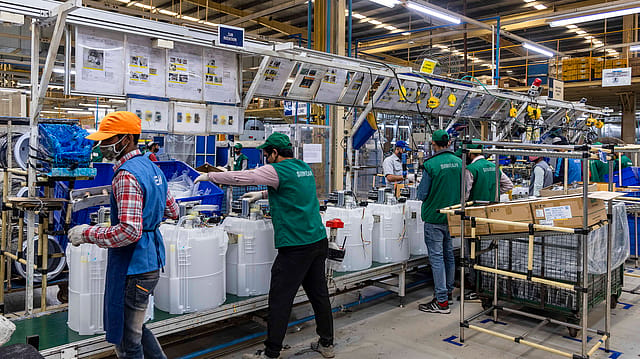India’s factory output slows to 4-month low in Feb
ADVERTISEMENT

India’s purchasing managers' index (PMI) declined to a 4-month low at 55.3 in February owing to a rise in input costs, according to the S&P Global India Manufacturing PMI report. In January, the manufacturing PMI stood at 55.4. The headline figure, however, remained above its long-run average of 53.7.
A reading above 50 indicates an overall increase in output compared to the previous month.
Input costs in the manufacturing industry increased further, with firms mentioning higher prices for electronic components, energy, foodstuff, metals and textiles, says the report. Despite quickening to a four-month high, the rate of inflation was below its long-run average and among the weakest in over two years, it says.
"Growth momentum in India's manufacturing industry was maintained in February, with new orders and output increasing at similar rates to January. Companies were confident in the resiliency of demand and continued to add to their inventories by purchasing additional inputs. Job creation failed to gain meaningful traction, however, as firms reportedly had sufficient staff to cope with current requirements. Indeed, there was only a marginal increase in their backlogs. Suppliers also appeared to have ample capacity to accommodate for rising input demand, shown by a stabilisation in delivery times," says Pollyanna De Lima, economics associate director at S&P Global Market Intelligence.
January 2026
Netflix, which has been in India for a decade, has successfully struck a balance between high-class premium content and pricing that attracts a range of customers. Find out how the U.S. streaming giant evolved in India, plus an exclusive interview with CEO Ted Sarandos. Also read about the Best Investments for 2026, and how rising growth and easing inflation will come in handy for finance minister Nirmala Sitharaman as she prepares Budget 2026.
"The PMI results suggested that most of the upturn in new orders welcomed by firms was domestically driven as international sales rose at a marginal pace that was the weakest in almost a year. After slipping to a 26-month low last November, input cost inflation surged in every month since. The latest rise was historically subdued, however, and among the weakest in around two years. The survey showed some reluctance among manufacturers to pass on cost increases to clients, with output charge inflation easing since January," Lima adds.
During the month under review, demand conditions and successful marketing campaigns, manufacturers experienced an increase in new work intakes. The upturn stretched the current sequence of growth to 20 months.
According to the report, the ongoing increase in sales and efforts to build inventories prompted firms to lift input purchasing in February. Buying levels rose sharply and at a rate that outpaced its long-run average. The seasonally adjusted Suppliers Delivery Times Index posted at the 50.0 no-change mark in February. Subsequently, Indian goods producers experienced another increase in their input inventories halfway through the first fiscal quarter.
